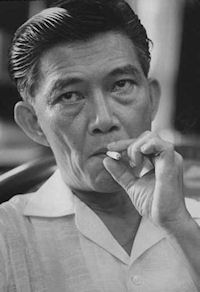Ngo Dinh Nhu (1910-1963)
 Their experience with Diem in the 1930s might have shown the French what to expect from Ngo Dinh Diem, but in mid-1954 they seem to have hoped that he would be hospitable to the preservation of their interests in the South. But Diem quickly disabused them of any notion that he would be as malleable as his predecessor, Prince Buu Loc. Diem's prompt displayof intransigence needed an explanation, and the French found it in the person of Ngo Dinh Nhu.
Their experience with Diem in the 1930s might have shown the French what to expect from Ngo Dinh Diem, but in mid-1954 they seem to have hoped that he would be hospitable to the preservation of their interests in the South. But Diem quickly disabused them of any notion that he would be as malleable as his predecessor, Prince Buu Loc. Diem's prompt displayof intransigence needed an explanation, and the French found it in the person of Ngo Dinh Nhu.
Eleven years younger than Diem, Nhu had been educated in France as an archivist and paleographer. Unlike his brother, Nhu was in Vietnam in the years just preceding the French collapse and was active in the party politics that Diem ignored. Around 1948, he founded the Parti Travailliste (Workers Party), which despite its small size-it was hardly more than a senuclandestine discussion group-kept the colonial authorities aware of his anti-French convictions. During the first year of Diem's rule, the French developed an unreasoning aversion to Nhu that they effectively communicated to the US Embassy in Saigon.
Nhu reciprocated this French antipathy and actively abetted his brother's concentration during that first year on expelling the colonial presence. The French were right about Nhu's importance to Diem, but almost certainly wrong in seeing Nhu as the source of Diem's intransigence. Nothing in CIA accounts of the period suggests that anyone but Diem set the government's priorities or that Nhu played any role but that of executive agent. Indeed, Nhu was diffident at first about making even routine operational decisions ; his impulse was always first to consult Diem. But Nhu's function was no less important for being that of loyal factotum.
If the policy arena belonged to Die m, its imp lementation became the province of his younger brother. This division of responsibility, which the passage of time only reinforced, was a product of three things. First was the administrative vacuum that confronted the new government. The coloniaJ administration had consciously restricted Vietnamese access to positions of discretionary power, and the French departure left the government staffed with Vietnamese who, whatever their nominal rank, were little more than clerks in a system designed to serve French interests. The second was Diem's indifference to the mechanics of govcmment. Even the CIA people in Saigon. generally more sympathetic than the Embassy staff, saw him as a hopelessly incompetent administrator who always lost the forest in the treess. Third. Diem proved unable to attract such administrative talent as was to be found in Saigon and to delegate real authority to the few good people serving him. The Workers Party had no vertical structure, and Nhu had no organizational or administrative experience.
Nhu did, however, have an intense interest in the theory of political organization. He was also the only member of the family other than Ngo Dinh Thuc, a third brother who was the Catholic bishop of a diocese in the Mekong Delta, to have a circle of political contacts in Saigon. Nhu's style, formed in the days of his anti-French agitation, was essentially conspiratorial and anti-establishment. He tended to see government institutions as a colonial legacy to be manipulated or, failing that, obstructed or neutralized. Nhu's contempt for the urban elite, whose values he saw as "more foreign than Vietnamese," had as a corollary the need to build an entirely new national leadership, capable of imbuing the population of the South with Diem's brand of anti-Communist nationalism.
The story of the failure of Nhu's institution-building efforts is, at the operational level, the story of the failure of the Diem regime. The CIA programs supporting these efforts did not prevent that failure, partly because the conceptual gulf between the Ngo brothers and their Agency contacts proved to be unbridgeable. But in 1954, all of that was still to come. During Diem's first year in office, with his survival very much in doubt, CIA was strikingly successful in helping him consolidate his government and in maintaining the US commitment to him as the instrument for preserving an independent, anti-Communist South Vietnam.
CIA officers sometimes entertained the prejudice against Ngo Dinh Nhu that many Foreign Service officers had adopted from the French. But "clientitis" - an uncritical commitment to one's clients, and demonization of their opposition - sometimes clouded the judgment of officers who were in direct contact with the Ngo brothers. CIA Chiefs of Station William Colby and John Richardson fell victim to clientitis, their protege being Diem's brother Nhu. Just as Lansdale recognized Diem's reactionary bent, Colby recognized Nhu's penchant to substitute theory for performance, but Colby never abandoned his advocacy of Nhu's counterinsurgency prescription. Richardson was even less detached, declaring his agreement with even the more convoluted of Nhu's pronouncements.
|
NEWSLETTER
|
| Join the GlobalSecurity.org mailing list |
|
|
|

